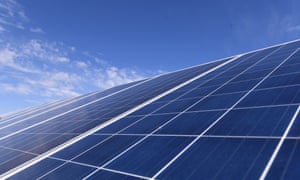Ambitious goal requires us to ‘get over the political roadblock’ says
Malcolm Turnbull, who backed climate change thinktank’s report
A dramatic expansion of renewable energy over the next five years
could establish Australia as a home for new zero-emissions industries,
cut electricity costs and create more than 100,000 jobs in the
electricity industry alone, a new analysis suggests.
The briefing paper by Beyond Zero Emissions, a climate change thinktank, presents an alternative vision to the Morrison government’s gas-fired recovery plan, arguing the shift to a clean electricity grid is inevitable and there are opportunities in accelerating it, rather than slowing it down. Renewable energy investment in Australia fell 50% last year.
The work is backed by the former prime minister Malcolm Turnbull, who described the central thesis of the report as “compellingly right”.
“That is, we have the opportunity to have zero emissions and cheap energy in Australia if we get over the political roadblock that has bedevilled the debate for so long,” Turnbull told Guardian Australia.
The report is the first stage of a “million jobs plan” being
developed by the thinktank. Turnbull is a member of an advisory board
supporting the project.The briefing paper by Beyond Zero Emissions, a climate change thinktank, presents an alternative vision to the Morrison government’s gas-fired recovery plan, arguing the shift to a clean electricity grid is inevitable and there are opportunities in accelerating it, rather than slowing it down. Renewable energy investment in Australia fell 50% last year.
The work is backed by the former prime minister Malcolm Turnbull, who described the central thesis of the report as “compellingly right”.
“That is, we have the opportunity to have zero emissions and cheap energy in Australia if we get over the political roadblock that has bedevilled the debate for so long,” Turnbull told Guardian Australia.
The report says reaching the target would require governments to send investors “an unequivocal signal” of support for large-scale renewable projects. Its three main recommendations include underwriting new “renewable energy industrial zones” with long-term fixed electricity prices of $50-55 per megawatt-hour in regional centres such as Gladstone, the Hunter Valley, the Latrobe Valley and Whyalla to support new clean industries, such as green hydrogen and zero emissions metals.
It says transmission lines around the country, many of which are already proposed by the Australian Energy Market Operator, would need to be fast-tracked, with governments intervening to overcome regulatory hurdles. It calls for local content requirements for wind turbines, batteries and transmission components, saying it could create 15,000 manufacturing jobs.
The report says a wind energy manufacturing industry could be created quickly by converting disused factories, as has happened in Geelong, where part of an old Ford construction site is being used to make wind farm components. “Leading turbine-maker Vestas has indicated that, given sufficient demand, it would expand manufacturing in Australia,” it says.
Beyond Zero Emissions’ chief executive, Eytan Lenko, said the shift to at least 100% renewable energy was inevitable, having been flagged more clearly than any technological transition in history, with only the timeframe in question.
Lenko said the group supported the government and the National Covid-19 Coordination Commission’s (NCCC) goal of expanding manufacturing through cheaper energy costs, but evidence suggested renewable energy was a cheaper and more sustainable path to recovery than gas.
“We want to end up in the same space, it’s just the underlying technology that’s different,” Lenko said. “To us, it’s completely obvious. We don’t have a competitive advantage with gas – America has a cheaper gas industry than we do – but we do have unlimited renewable energy capacity. That’s the future, and the trend is unstoppable in terms of costs.”
The report is part of a growing global call for governments to respond to the economic shock of the coronavirus crisis with policies that also help tackle the climate crisis.
Assessments before the pandemic found solar and wind backed by storage were likely to be the cheapest source of new electricity in many cases, but the government and the NCCC have emphasised gas, a fossil fuel, as the key to driving economic recovery. The government continues to reject international and domestic calls to set a target of net zero emissions.
Beyond Zero Emissions released a report calling for 100% renewable energy a decade ago. It now says this goal is uninspiring, and that Australia could reach it simply by maintaining the installation rate of the past two years.
It quotes Darren Miller, chief executive of the Australian Renewable Energy Agency, who has suggested the country could and should aim for a six-or-seven fold increase in electricity generation to power new clean industries. Bloomberg New Energy Finance found the cost of solar panels had fallen 85% over the past decade and onshore wind energy 49%.
Lenko said in 10 years nobody would be talking about building too much solar. “It’s on such a fast cost decline, it will be completely non-controversial to make use of it to power industry,” he said.
Turnbull, who launched Beyond Zero Emissions’ first report while an opposition backbencher in 2010, cautioned against a system that “picked winners” but said there were real opportunities in clean manufacturing.
He acknowledged there had been criticism of the government’s latest energy policy, a technology investment roadmap, as being a plan without a destination, and said there should be a clear objective of creating a “green, cheap and reliable” energy system.
He said some people were yet to grasp that the marginal cost of running a renewable energy plant was zero. “The price we are paying for our devotion to fossil fuels is higher electricity prices,” he said. “It honestly beggars belief.”

No comments:
Post a Comment